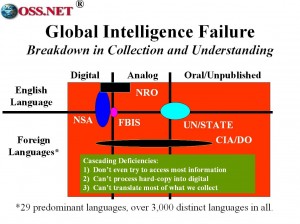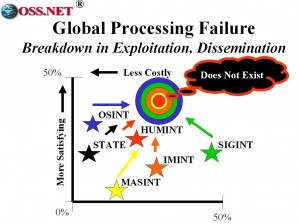
IC's Language, Linguistic Shortfalls Under Scrutiny
by Anthony L. Kimery
Thursday, 21 January 2010
The IC still has important pockets of critical intelligence analysis that continue to suffer.
The rank and file analysts at the CIA, NSA and elsewhere throughout the Intelligence Community (IC) are patriotic, dedicated … hardworking. But they have long been hampered by a lack of both linguists and language proficient subject matter experts to help them make sense of the overwhelming storm of intelligence that is routinely siphoned from the air and gathered by human intelligence sources every day. This blizzard of information is blinding.
According to IC sources HSToday.us talked on background, the IC’s failure to detect the recent attempted terrorist attacks on the US homeland wasn’t just about the failure to connect the existing dots – of which there were many – but also was because of the inability to quickly and effectively interpret country-language specific intelligence, such as that which was collected in Yemen.
. . . . . . .
Last July, the Senate Select Committee on Intelligence reported that it “is concerned about the abysmal state of the Intelligence Community’s foreign language programs.”
The Committee’s report noted that “the collection of intelligence depends heavily on language, whether information is gathered in the field from a human source or from a technical collection system. Even traditionally nonlinguistic operations such as imagery rely on foreign language skills to focus and direct collection efforts.”
However, the Committee concluded, “almost eight years after the terrorist attacks of September 11th and the shift in focus to a part of the world with different languages than previous targets, the cadre of intelligence professionals capable of speaking, reading, or understanding critical regional languages such as Pashto, Dari, or Urdu remains essentially nonexistent.”
Continuing, the report stated that “the Intelligence Reform Act required the DNI [Office of the Director of National Intelligence] to identify the linguistic requirements of the Intelligence Community, and to develop a comprehensive plan to meet those requirements.”
But “five years later, the ODNI has still not completed an IC-wide comprehensive foreign language plan that designates specific linguist or language requirements, lays out goals or timelines, or designates specific actions required to meet them.”
Phi Beta Iota: Nothing has changed. Most of the information that needs to be collected, processed, and exploited is not secret, not in English, and not online. A national or defense open source center with a global multinational engagement grid would blow this problem away virtually overnight. Below is our original chart from the 1990's–as Senator David Boren noted in his Foreword to ON INTELLIGENCE: Spies and Secrecy in an Open World (AFCEA, 2000), the IC leadership has refused to implement the Aspin-Brown Commission recommendations.
 And then there is the short-fall in processing.
And then there is the short-fall in processing.
What we keep stressing–what we have been stressing for 21 years now–is that a national or defense open source center and global multinational engagement gird addresses both of these problems–resolves 80% of both of these problems, at low cost and in short time.
 This would be a good time to actually answer the Congressional demand for a report on defense open source intelligence.. See 2006 House Appropriations Committee Public Law 109-163 6 January 2006 Section 931 Department of Defense Strategy for Open-Source Intelligence.
This would be a good time to actually answer the Congressional demand for a report on defense open source intelligence.. See 2006 House Appropriations Committee Public Law 109-163 6 January 2006 Section 931 Department of Defense Strategy for Open-Source Intelligence.



